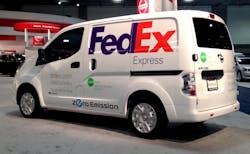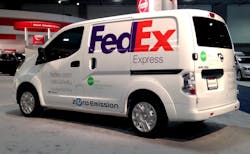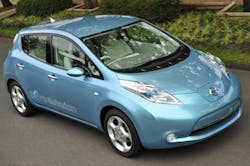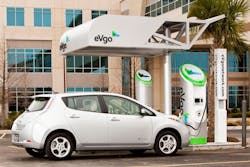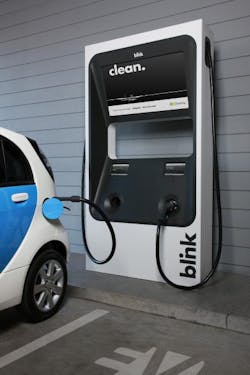Nissan is kicking off a new round of “work truck testing” for its all-electric NV200 cargo van model in Washington D.C. in partnership with package delivery giant FedEx Express, a subsidiary of FedEx Corp.
Nissan noted that this particular test vehicle marks the first time all-electric NV200 is being put through its “work truck” paces in North America, as the OEM has tested the electrified NV200 model (officially called the “e-Nv200”) with FedEx’s fleet operations in Japan, Singapore, Brazil, and the United Kingdom over the last several years.
FedEx plans to deploy its Nissan e-NV200 in the Washington, D.C. area, where it will undergo field tests subjecting it to what the package carrier calls the “routine requirements” of a delivery vehicle, with the results will be used to help determine the viability of using an electric vehicle in this role in the U.S.
FedEx Express said it currently has 167 electric vehicles and 365 hybrid electric vehicles deployed in the U.S., France, Germany, Italy, Japan and China, and plans to increase those numbers to 222 and 393, respectively, by May of this year.From 2005 to 2012, FedEx noted that using those types of vehicle in its fleet enabled the company to save nearly 2.4 million liters of fuel, equivalent to roughly 634,000 gallons.
"We're eager to work with FedEx and other companies to put the e-NV200 through its paces to continue to build awareness of the capability of electric vehicles and to evaluate how well it meets the needs of the commercial consumer," said Erik Gottfried, Nissan’s director of electric vehicle sales and marketing, adding that the e-NV200 is scheduled to begin mass production later this year in Europe.
"We'd also like to explore clever uses of EVs in work environments where carbon emissions of gas-powered vehicles make them impractical or impossible to use,” he noted.
[The NV200 cargo van platform, upon which the e-NV200 is based, is also a vehicle Nissan believes can be highly customized to better meet the needs of a variety of work categories. You can read more about that here and view some photos of such customization concepts by clicking here.]
Gottfried noted that the front-wheel drive e-NV200 is fired by the same lithium-ion battery system powering Nissan’s LEAF all-electric car, adding that the e-NV200 can be charged up to 80% of its full capacity in less than 30 minutes when equipped with a quick charge port and using a fast charger.Electrifying work vehicles in the manner above seems to be but the tip of the iceberg where electric vehicle (EV) usage patterns are concerned.
Consulting firm Navigant Research, for one, expected the global EV industry to witness significant expansion this year, in part because luxury automakers such as Audi, BMW, Cadillac, Mercedes, Saab, and Volvo will all introduce their first EVs with more affordable EV options on the way from Kia, Mahindra, Skoda, and Volkswagen.
“Since electric vehicles require less maintenance and replacement of parts, which currently provide considerable revenue to dealers and automakers, car companies are looking to diversify their revenue streams,” noted John Gartner, research director with Navigant. “One of the most promising avenues is partnering with utilities and energy aggregators to incorporate electric vehicles into demand response and other ancillary services.”
Furthermore, Gartner believes 2014 will be a “watershed year” for EVs, in part because more than 2.2 million electric drive motors are expected to be shipped over the next 12 months.
Navigant thinks the fast-growing market for EVs, which includes hybrid electric vehicles (HEVs), plug-in hybrids, and battery electric vehicles, while still small, is becoming a “more important part” of the global automotive industry particularly as governments across the globe are keen to see increasing penetrations of EVs due to the environmental, economic, and energy security benefits engendered by them.
As such, government incentives to spur growth in EV development have been fundamental to growing plug-in electric vehicle (PEV) penetration within the overall light duty vehicle market. Meanwhile, demand is increasing among fleet operators and consumers alike, Navigant said, with Japan and the U.S. in particular expected to be the largest markets for HEVs, with sales reaching just over 1 million and 1.1 million units in 2022, respectively.The firm also thinks the U.S. will remain the largest market for PEVs, netting sales of over 467,000 sales units in 2022.
Yet can EVs truly become a “mainstream” vehicle option in this country? That remains to be seen. Yet a survey Union of Concerned Scientists (UCS) and Consumers Union, which publishes the Consumer Reports magazine, late last year determined that four out of 10 U.S. households could use an EV with little or no change to their driving habits and vehicle needs.
“While less than 1% of the country are driving electric vehicles (EVs) today, the survey found 42 percent of respondents with cars – equivalent to 45 million households when applied nationally – meet the basic criteria for using plug-in hybrid electric vehicles, such as the Chevy Volt,” noted Josh Goldman, policy analyst for the UCS’s Clean Vehicles Program.
“More than half of those households are also able to use a battery-electric vehicle (BEV), such as the Nissan LEAF,” he added. “Drivers may have preconceptions about whether electric vehicles can meet their driving needs and habits, and this survey shows that for many, they can.”
[FYI: The UCS and Consumers Union based its results on a telephone survey conducted among 1,004 randomly selected adults over 18 years of age carried out from September 26 to September 30 last year. Of those surveyed, 914 respondents had at least one vehicle and were asked about driving and parking behaviors.]
While plug-in hybrid EVs have similar driving range to gasoline-only vehicles, the current range of BEVs on the market today can also meet many drivers’ needs, the UCS survey found, with almost 70% of drivers saying they drive less than 60 miles on a weekday, which is within the range of almost every BEV on the market today.
“This new survey shows today’s EVs can be practical for many car buyers,” noted Shannon Baker-Branstetter, policy counsel for Consumers Union. “It demonstrates that these vehicles could be a viable option for tens of millions of American households that want lower fuel costs and cleaner air without compromising their driving needs.”
So what might be the energy implications for the U.S. if everyone who could switch to driving on electricity did so? Here’s what the UCS says:
- It would save 15 billion gallons of gasoline each year, more than all the gasoline consumed last year by the entire state of California
- Avoid 89 million metric tons of greenhouse gas emissions each year, equivalent to removing 14 million of today’s gasoline cars from the road a year
- And save $33 billion on fuel each year – based on gas prices of $3.60 per gallon and electricity costs of 12 cents per kilowatt hour.
While incentives that lower the cost of purchasing an electric vehicle will continue to play a key role in expanding the market for these vehicles, the findings suggest that efforts to increase access to vehicle charging options at home and the workplace can also help make EVs a more likely choice for vehicle buyers.
The UCS survey found 65% of Americans think electric vehicles are an essential part of the U.S. transportation future for reducing oil use and global warming pollution, with 60% saying they would consider owning one for themselves.
Yet saying you’d want to own an EV is one thing; actually buying an EV, as most are still pricier than a comparable sedan or van, is something else entirely.
For example, a study conducted by the Massachusetts institute of Technology back in 2012 found that while electrified trucks certainly cost less to operate, the sticker price is way more than a comparable diesel-fired model – and that may be very off-putting to many buyers, whether they be commercial fleets or individual consumers.
It will be interesting to see how this debate between higher sticker price and lower operating cost plays out where EVs are concerned.
